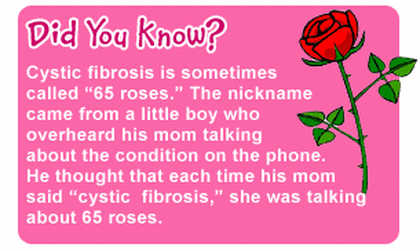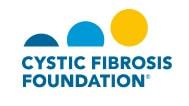What is Cystic Fibrosis?
Cystic fibrosis is a progressive, genetic disease that causes persistent lung infections and limits the ability to breathe over time.
In people with CF, mutations in the cystic fibrosis transmembrane conductance regulator (CFTR) gene cause the CFTR protein to become dysfunctional. When the protein is not working correctly, it’s unable to help move chloride -- a component of salt -- to the cell surface. Without the chloride to attract water to the cell surface, the mucus in various organs becomes thick and sticky.
In the lungs, the mucus clogs the airways and traps germs, like bacteria, leading to infections, inflammation, respiratory failure, and other complications. For this reason, minimizing contact with germs is a top concern for people with CF.
In the pancreas, the buildup of mucus prevents the release of digestive enzymes that help the body absorb food and key nutrients, resulting in malnutrition and poor growth. In the liver, the think mucus can block the bile duct, causing liver disease.
In people with CF, mutations in the cystic fibrosis transmembrane conductance regulator (CFTR) gene cause the CFTR protein to become dysfunctional. When the protein is not working correctly, it’s unable to help move chloride -- a component of salt -- to the cell surface. Without the chloride to attract water to the cell surface, the mucus in various organs becomes thick and sticky.
In the lungs, the mucus clogs the airways and traps germs, like bacteria, leading to infections, inflammation, respiratory failure, and other complications. For this reason, minimizing contact with germs is a top concern for people with CF.
In the pancreas, the buildup of mucus prevents the release of digestive enzymes that help the body absorb food and key nutrients, resulting in malnutrition and poor growth. In the liver, the think mucus can block the bile duct, causing liver disease.
Symptoms of Cystic Fibrosis
The severity of cystic fibrosis symptoms is differs from person to person. The most common symptoms are:
- Very salty-tasting skin
- Persistent coughing at times producing phlegm
- Frequent lung infections, like pneumonia or bronchitis
- Wheezing or shortness of breath
- Poor growth/weight gain in spite of a good appetite
- Frequent greasy, bulky stools or difficulty in bowel movements
- Male infertility
How do people get cystic fibrosis?
Cystic fibrosis is a genetic disease. People with CF have inherited two copies of the defective CF gene -- one copy from each parent. Both parents must have at least one copy of the defective gene. People with only one copy of the defective CF gene are called carriers, but they do not have the disease. Each time two CF carriers have a child, the chances are:
- 25% (1 in 4) the child will having cystic fibrosis
- 50% (1 in 2) the child will be a carrier but will not have CF
- 25% (1 in 4) the child will not be a carrier and will not have CF
Statistics
|
|
Currently, there is no cure for Cystic Fibrosis.
However, specialized medical care, aggressive drug treatments and therapies, along with proper CF nutrition, can lengthen and improve the quality of life for those with CF.
In the 1950s, few children with cystic fibrosis lived to attend elementary school. Today, advances in research and medical treatments have further enhanced and extended life for children and adults with CF. Many people with the disease can now expect to live into their 30s, 40s and beyond.
In the 1950s, few children with cystic fibrosis lived to attend elementary school. Today, advances in research and medical treatments have further enhanced and extended life for children and adults with CF. Many people with the disease can now expect to live into their 30s, 40s and beyond.
The above information was taken from the Cystic Fibrosis Foundation website.



